FOOD FEARS
Deliver us from lockdown
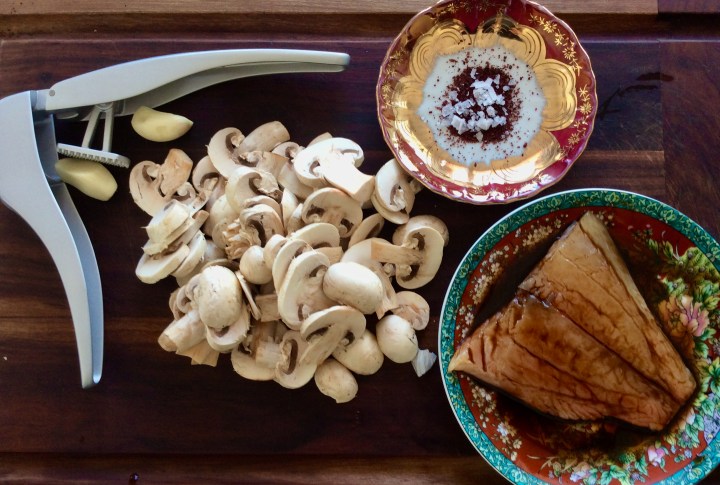
It’s a brave new world we find ourselves in right now. New for all of us. More desperate for some than for others. A world where things that aren’t supposed to happen, and things we never thought would happen, and things we never expected we’d be doing, have become the norm. Take these past few days in Durban…
“Hi guys. Don’t know if you know, I’m involved with a farm. We usually supply restaurants and hotels in Durban. Now with lockdown we have a farm full of produce. We’re still able to deliver – and to your doorstep during lockdown.”
My friend from the States, Frances, holed up in the flat downstairs for lockdown, forwards me the WhatsApp she’s just been forwarded. We can get a brown paper bag with 400g of mushrooms for R25, a salad pack of 300g mixed lettuce for R20, a 100g sleeve of spring onions for R10, chopped spinach (no stalks) for R15, 100g of baby spinach for R10 and butternut for R10 per kg.
“I’m interested,” she writes. “But my order would be small. Consolidate?”
Many a sophisticate may be surprised by this admission. As of last week and before this message, I had never ordered a food delivery.
I can see now that going back probably 40 years, given how time flies, an image got planted in my mind. A movie image. There is this couple. In fact, make that many images, many couples, many movies. In each case, said couple are cosy on a couch or in bed. Always there is a TV. They are in the US. Most likely New York. And they’re eating Chinese takeaway. From a neat little box. Using chopsticks.
Chinese takeaway, ordered in. Delivered to the door. Given the era, it would have been sweet and sour pork. Or chicken. My perception, as in the notion that planted itself wherever it is such things plant themselves and live, unquestioned, for years, was that ordering in, getting a take-out delivery, was the essence of style. Of sophistication. Of indulgence. Not for the likes of me.
Preposterously, I now realise, this same perception transferred and got attached to pizza deliveries. Pizzas from pizza chains I wouldn’t go buy a pizza from. But ordering in. Pizza delivered. Sophisticated. Indulgent. Wow.
On the other hand, farm produce deliveries, dropped off at different locations for pickup. These I have balked at for quite a different reason. Deliveries from small organic farmers one wanted to support when I lived in California. Ditto, on a smaller scale, here in Durban. Deliveries where you get what is in season. And when I’ve looked in the boxes, what’s in season covered in soil. Food items you’d need to scrub. Some you’d need to ask on Facebook: what is this? These deliveries I’ve felt guilty for not ordering.
So I am not an earth mother any more than I am a sophisticate.
But times they have a’changed. Now, I walk to the grocery store. With a little backpack and a couple of Trader Joe’s shopping bags. Cloth. From my days in California. There are three grocery stores that I can walk to. The walk, depending on the destination, is between 15 and 30 minutes each way.
I walk because I can. I have no dog. I walk because I like to walk. I walk because I have no car. I cannot drive at this point in time, by chance coinciding with lockdown, because I am rehabbing. I walk with a crutch, both to steady myself if I need to. And thinking, also, it might be a good weapon if I am set upon. For my groceries.
Which is a joke. But perhaps not.
So now, I consolidate with Frances. She places the order. I am piggy-backing on her delivery. So perhaps it doesn’t count. But I feel excited that I’ve broken the ice.
It is the delivery that inspired this story. A story in a sense about the brave new world we find ourselves in right now. New for all of us. More desperate for some than for others. Where things that aren’t supposed to happen, and things we never thought would happen, and things we never expected we’d be doing, have become the norm.
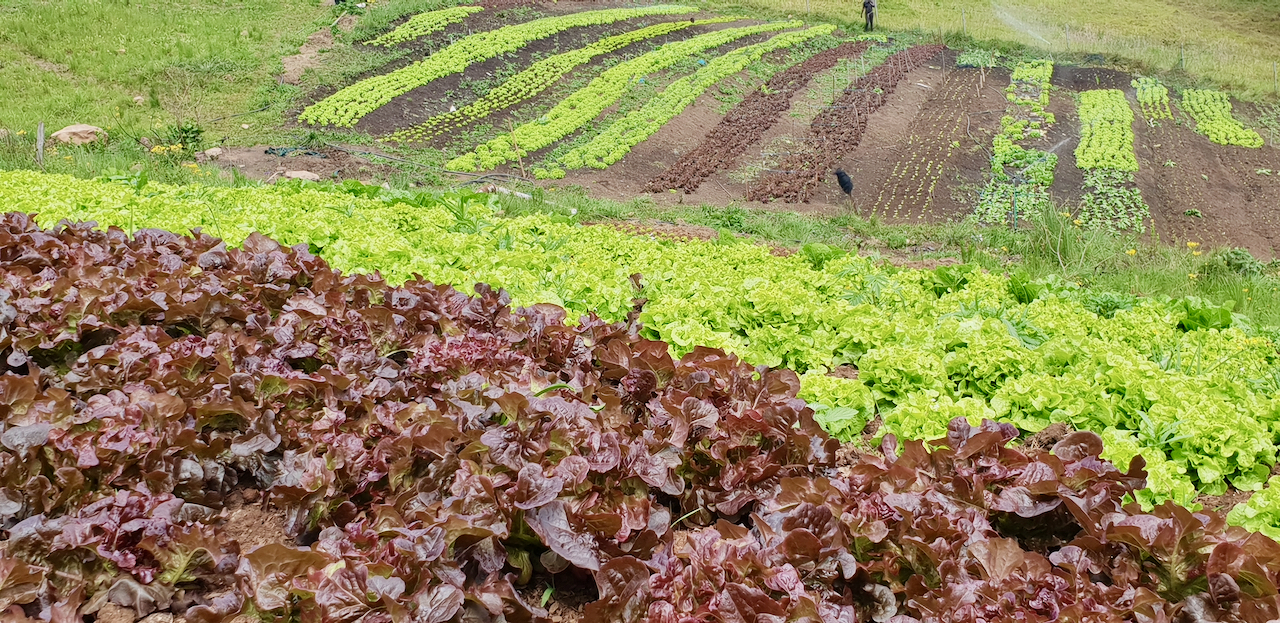
The luxury of lettuce, a possibly disappearing crop. (Photo: Supplied)
When the time comes, Frances WhatsApps: “She’s delivering this afternoon. I’ll meet her at the gate. I’m curious to see what we get.”
I am curious too. Not relishing the thought of digging off the soil.
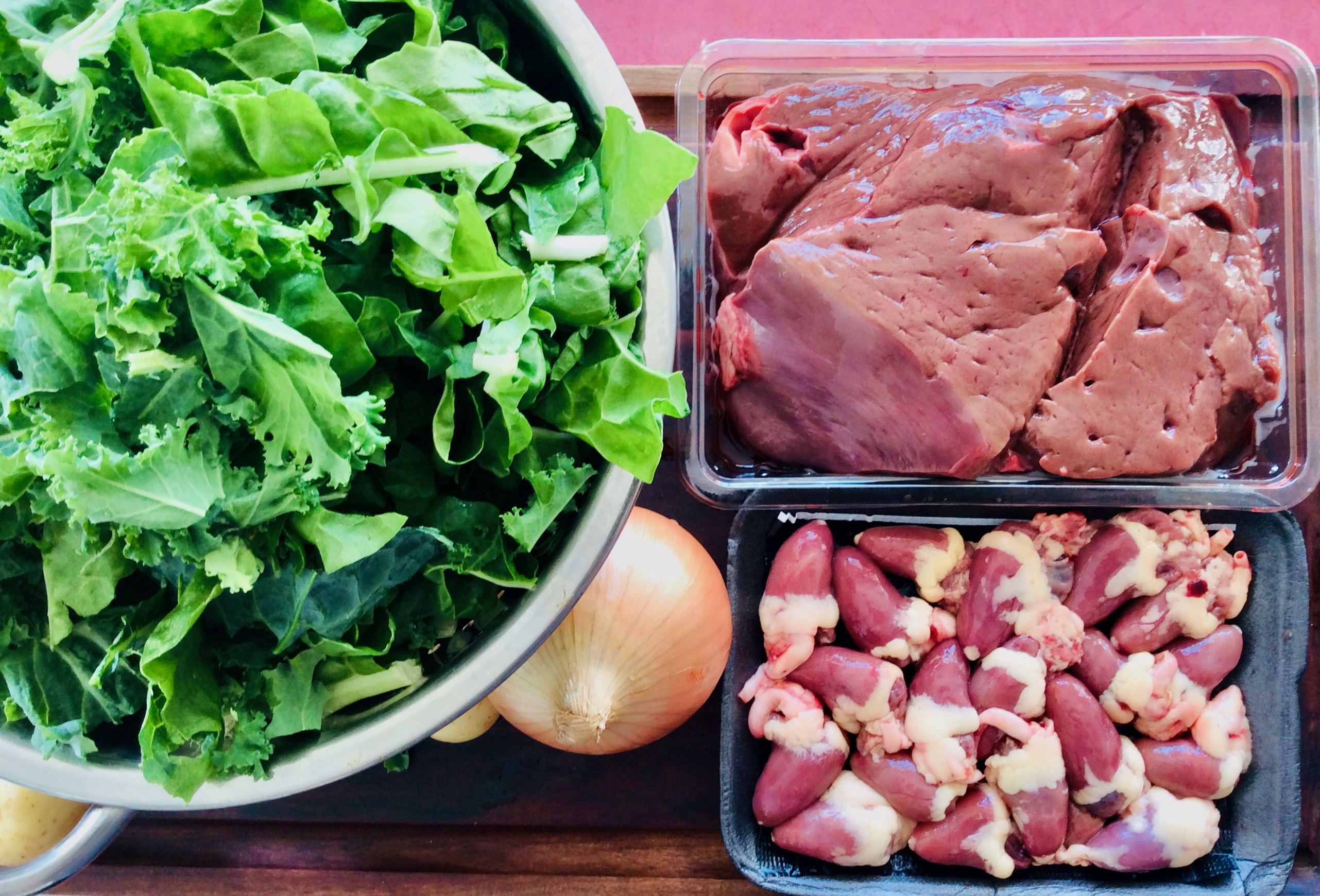
Lockdown experiments with ox liver and chicken hearts. (Photo: Wanda Hennig)
It’s Saturday morning and I’m cooking. Not the delivered produce, but ox liver and chicken hearts. As I’ve never cooked ox liver, I post a picture and a “how to” question in the Locked Down Kitchen group, featured in last week’s TGIFood. The advice makes sense. I will dust the ox liver lightly with a dash of flour (someone’s suggestion) mixed with (my addition) the delish leaf masala bought before lockdown at Durban’s Spice Emporium. Ditto the chicken hearts. I will turn these into two separate casserole-type dishes, given the warning I get from a couple of Locked Down cooks that long-time simmering of the ox liver will toughen it. Which makes me think of boarding school where the liver might well have been leather.
The ox liver and chicken hearts are for delivery. By me. To the Zulu man who works where I live. A friend. Sometime adviser. Frances says in the US he would be called a custodian. Sounds good to him. So now he is.
David usually cooks for himself. He usually adds variety to his menu from the ready-cooked counter at the nearby SuperSpar. Which he was unhappy to learn was closed during lockdown.
First weekend I roasted him a chicken and chicken thighs. Second weekend, Easter weekend, I roasted him an extra large extra special chicken I walked to Dirks, favourite local butchery, to buy. I have illusions of grandeur around my chicken roasting, believing I channel my late father, a superior chicken roaster.
The third weekend I see the ox liver and chicken hearts while on an early morning masked shopping expedition at SuperSpar and decide to get adventurous.
I am cooking for David because I like to cook and because he is here, in Durban, where he lives, and his wife and family are all trying to keep safe where they live, on their farm near Mandeni.
I say trying to keep safe. Because it is difficult to keep safe when you’re advised to wash your hands a lot to keep safe. And you’re living in a rural Zululand homestead where there is no running water.
Early in lockdown it was announced that nobody in South Africa should sell JoJo tanks any more except to the government. That JoJo tanks would be delivered to rural communities. That every community would have water. Lots of things were said about water delivery. I listened and David listened and we discussed. He called numbers in Mandeni and the toll-free Pretoria central water depot number, which was given at a media briefing on TV.
He tells me how things work there, always have, still do in 2020, is that a water tanker comes by on Sundays and everybody in his homestead and the cluster of nearby homesteads runs out with every container they have. All of what they can collect is their water for the week. Not only for washing hands but for washing everything else too. For cooking their food. For drinking. For staying alive, if you think about it.
If you’re not at home on a Sunday and you miss the water tanker, tough shit.
The expectation was that this would change. It has not changed.
We made a case last weekend, responding to a Zululand Observer article posted on Facebook. “Give us the number and we’ll look into it,” someone from the paper responded. We did. A reporter phoned David and asked him a lot of questions.
There are many things living in South Africa teaches you. One of them is to live in hope.
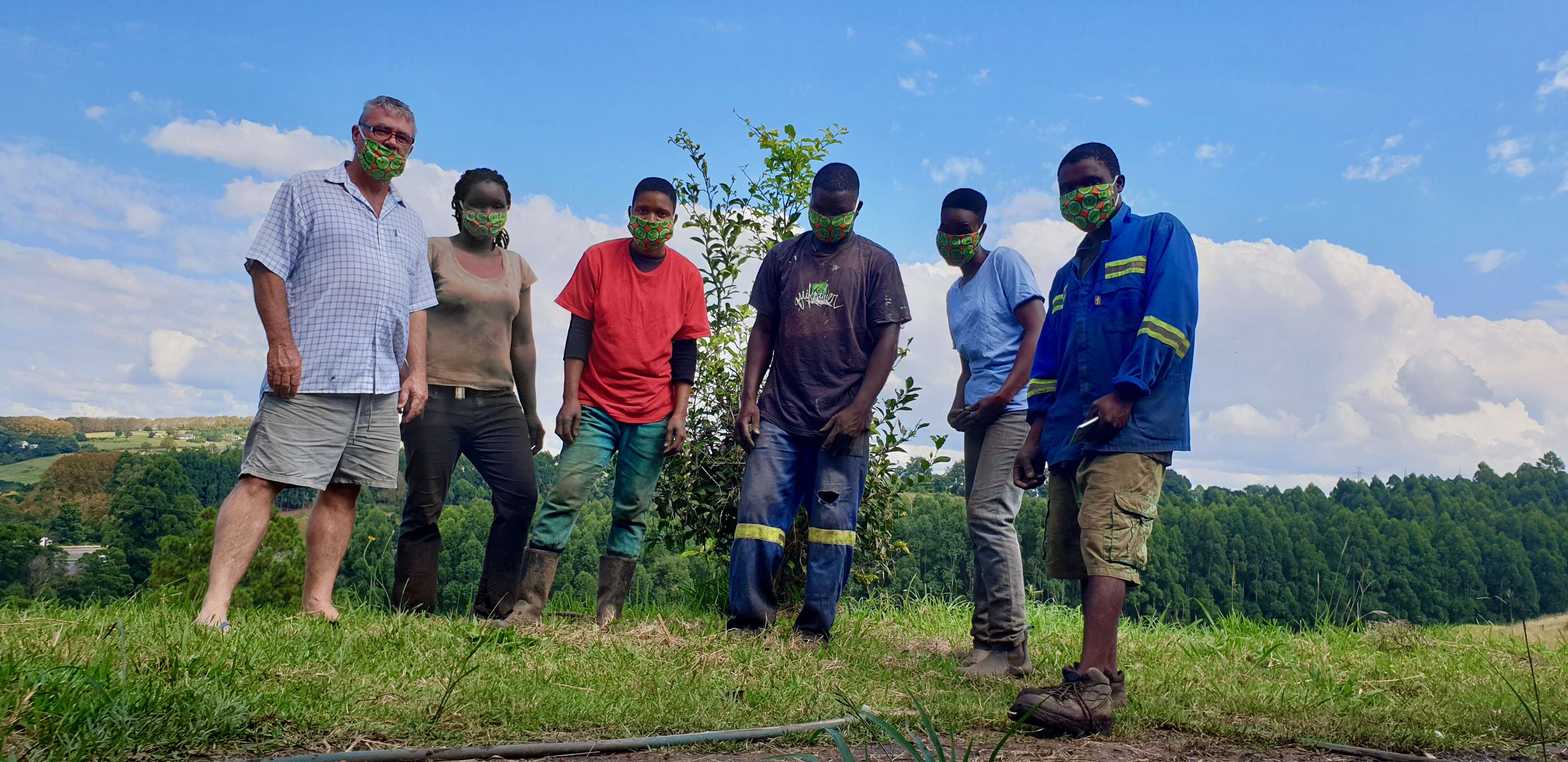
Neil Purves and his team masked up for lockdown harvest. (Photo: Supplied)
When I separate the lettuce that arrives, each leaf is perfect. When I rinse the spinach, there’s not a spot of soil on the ready-to-braise leaves. When I go to slice the mushrooms, they are blemish-free. Sublime spring onions, edible tip to root. I didn’t order butternut, balking at the labour. Neither did Frances. “But it was all chopped up,” she tells me, having spotted it in the van. We both agree we will add it next time.
All this begged the question. Where is this produce coming from? Some huge conglomerate to present it so perfectly is my guess, I say to Frances.
It doesn’t take me long to track down, via Charlene who does the deliveries, veggie farmer Neil Purves. Who is not quite sure how he got into farming, but after a career in electronics and production management and inventing and patenting a couple of agricultural products and a stint in maize milling and hospitality, he decided to start a mushroom farm, growing them in shipping containers on a rental property in Botha’s Hill.
Which turned out to be a hugely expensive and involved enterprise. So he evolved into the fresh produce. Gave up on the mushrooms. And moved to his current 3-hectares at Assagay, where after clearing bush and developing and conditioning the soil, he’s been niche farming his beautiful produce (triple-washed before delivery) for just 15 months. Supplying till just before lockdown a select range of Durban and Pinetown Wimpy, Mugg and Bean, Lupa, Spur, Circus Circus and other Famous Brands outlets.
He’s shifted, pretty much on a dime. “Before, we knew exactly what to grow. The exact demand and orders. Now, it’s all fluid,” he says, sharing his considerations thoughtfully; thinking solutions.
“One needs, now, to evolve. Not evolving will be the death of companies. It’s a scary time.” He’s happy he’s been able to keen on all five staff members, although they’ve cut back the work week by two days.

Not a luxury: part of the increased spinach crop. (Photo: Supplied)
“We have to work out how we’re going to survive after all this. One thing, we’ve had to change our focus from lettuce as our main crop to spinach. People are now more interested in nutritional produce than luxury.
“Historically we were planting 8,000 seedlings every Monday. Now we’re planting 4,000.”
His son is a casualty doctor in Gauteng. They talk regularly. He is well aware that while everyone has to eat, a lot of people are going to die.
“We’ve created a new avenue for our produce. We’ve launched an Assagay Multi Farms website. Once lockdown is over we’ll add to what we’re doing. Once it’s safe to go to market, we’ll still do home deliveries as long as they’re needed, as long as there is a demand. This is our new string. Because I don’t believe half our restaurants will recover.”
They’re also doing future marketing, he says. “Donating salad packs and mushrooms (in collaboration with Cato Ridge-based Forest Mushrooms — our mushrooms) to old age homes. Some of them are sub-economic and rely on social grants. It’s wonderful to be able to give to them. Others have their own kitchens and may purchase from us in the future.”
Right now, he says, it’s about moving produce rather than letting it go to waste. About testing new markets. “The crops don’t know about lockdown. They keep on growing.”
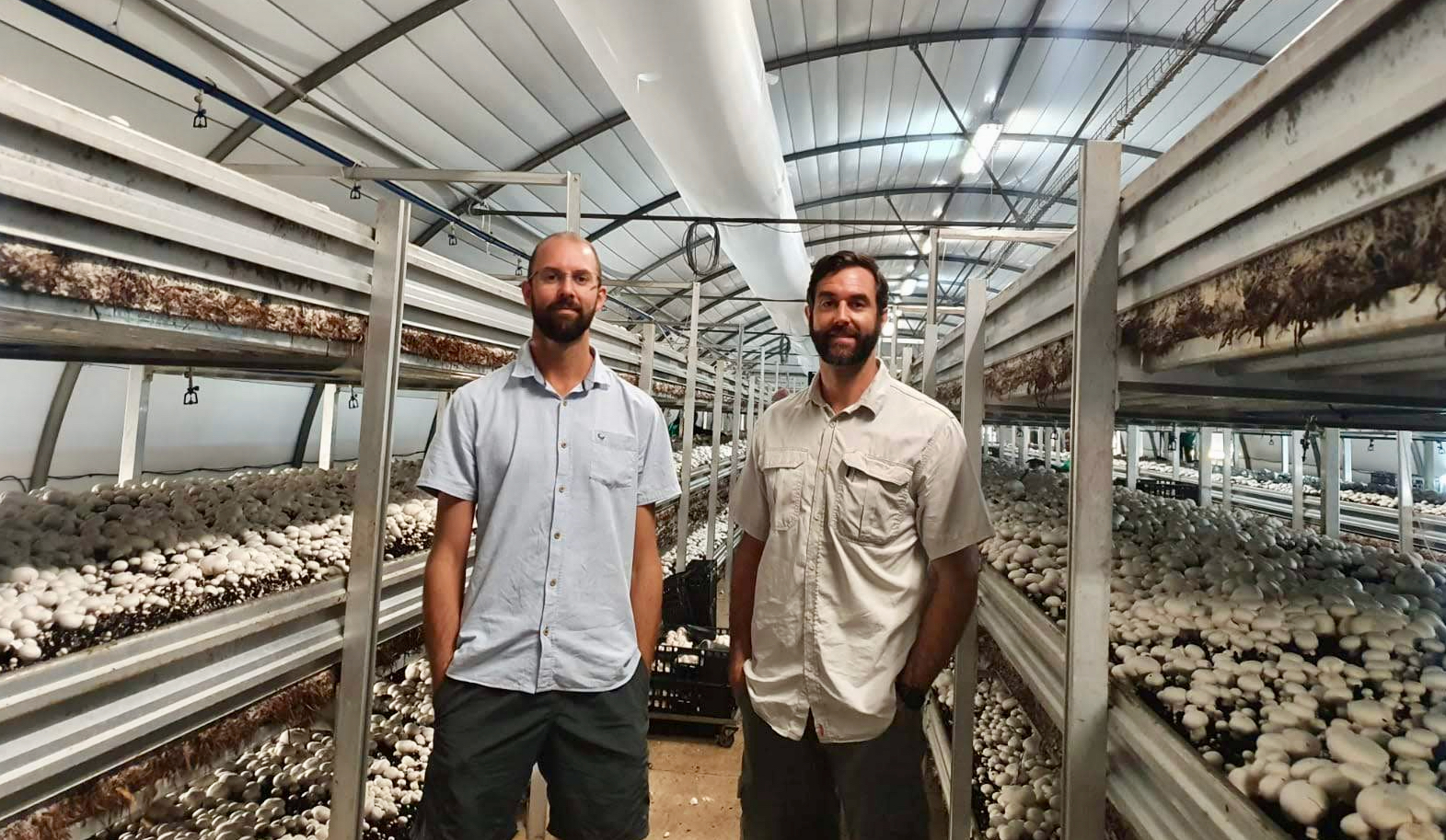
Mark and Steven Stewart with their mushrooms, under threat. (Photo: Supplied)
I call Forest Mushrooms’ founder-owner Rob Stewart, curious to know what’s going on there. He’s a long-time farmer. Forty years. Tells me he did “my prison sentence” in the Limpopo region, farming sub-tropical fruit. “It’s hard up there. The weather. The drought.”
Twenty years ago the Durban boy came home. Started farming mushrooms. First a small farm at Assagay. Then 12 years ago he expanded to Cato Ridge.
Until the world turned around, they were supplying “all retail in KZN”: Checkers, Pick n Pay, Spar groups. And the catering trade, including Debonairs Pizza, throughout KZN.
Stewart was at sea until not too long before lockdown, competing in the Clipper Round the World Challenge, which sees “Eleven identical yachts race round the world. I was doing four of the eight legs. The boats are now tied up in the Philippines. I will rejoin in January next year.”
His two sons, Steven and Mark, have been running the business. “It’s a family affair.” With sales manager Vuyani Wilson Mseswa, a South African Strongman heavyweight.
“We’ve lost 50% of our sales. Pizza houses, pubs, restaurants. The shipping trade. All gone,” says Stewart.
“All we can do to reduce our production is to cut compost production. It takes eight weeks to come into effect. We’re still now picking off the compost produced before lockdown.”
If the economy doesn’t come right within the next six months, “mushrooms are a luxury food, not a staple food, we will close down”.
“If the economy shrinks it will mean the man in the street won’t have any money.
“And you can’t turn a mushroom farm into anything else. They grow in the dark. It’s a very expensive operation. Computers control everything. We import peat each month from Ireland so there’s the exchange rate. We need to cover costs.
“A lot of restaurants likely won’t open again. We’re hoping fast foods will open. They will help.
“But tourists won’t come flooding back. I’ve spoken to other farmers. International demand for citrus is right down. And avos. And China is the biggest market for macadamias and that’s right down. Exports are way off. The restaurants, many have had no income for weeks. Other small businesses too. What is going to kickstart them?”

Home cooking with delivered mushrooms, a salad and a bit of fish. (Photo: Wanda Hennig)
I’m making lunch on Saturday. For me. I’ve sliced and fried some of Stewart’s mushrooms in olive oil with garlic, and a small piece of straight-from-the-ocean Bartho’s “red”. Made a little salad with the few leaves of rocket from the garden downstairs that by some miracle survived the bugs.
I check when I get a Whatsapp. See it’s from the man I have in my phone as “Pascal student”. Pascal is Congolese. Three or four years ago, he came to Talk English classes, where volunteers help a mix of adult Zulu speakers and foreign students from other parts of Africa converse better in English. Back then he asked me for my number. Sometimes he would practise his English by WhatsApp. Once when a young academic from the US was staying with me, researching Congolese hairdressers in Durban for her social anthropology Masters, I linked her up with Pascal. He helped.
He connects every five or six months to say Hi. This time it’s a different sort of message.
“I am asking for help if you know some organisation who distribute food or any help during lockdown time. Can you connect me to them please. We can’t work and my provisions are almost finished. I wish you best, good and strong health.”
I write back. I’ve heard there are feeding schemes down near South Beach where I know he lives in some semi-derelict accommodation in dire conditions doing his best. Now, I discover, with two friends in a tiny room. “There is a feeding scheme for citizens. Not for foreigners,” he writes back. “Another one told me to wait for a food parcel. We been waiting a week.”
I WhatsApp my chef friend Marco, who has been working with a Muslim feeding scheme. Perhaps they deliver hampers in the neighbourhood. He gets it out on the website to all the volunteers. Gives my number. Still no luck five days later.
I connect with Julie, Talk English founder and chief organiser. She calls her contact at Refugee Social Services (RSS). They’re closing at 1pm. She gets an emergency number for Pascal to call on Monday. Turns out he called it some days ago. Awaits a response.
“What do they need?” she asks. “Maybe we could pay for some food.”
“We need only basic food. Rice, oil, beans, nyala,” Pascal responds.
I balk at contacting Faye, a friend who lives at the beachfront who people call on much too often because she always helps. But finally after many dead-ends, I do. Ask her if he can come to her block, walking distance, will she give him R200 for food and I will immediately transfer the money to her by EFT? She says sure, she will meet him at her back gate in half an hour. He gets his tide-over money. She tells me I can owe her a dinner.
Pascal WhatsApps a thank you. Writes: “We are like soldiers in the war. Any good ideas, please send. We must try any suggestions just to survive.”
On Monday, I contact Yasmin, head of RSS. Tell her Pascal’s plight. She tells me they’re getting 300 calls a day. Prioritising children, the disabled and the medically compromised. There is nothing she can do for him. But she does tell me one can now purchase a food voucher online and send it electronically: a new Shoprite service since lockdown.
I EFT a token amount into Pascal’s phones. Tell him Julie or I will send a voucher.
Because every food option, I have learned, is now beyond its limits. Shelters are no longer admitting people for fear of letting in the virus. They’re full, anyway, as are feeding schemes. Hamper services, even Gift of the Givers, have currently exceeded their capabilities.
On Monday, much earlier, thinking of Pascal, I look out my window. It is refuse day. The black bags from our building are already out. The first week of lockdown, nobody came to search through the bags, as used to happen. The second week, I noticed the bags had been opened. Now I watch a man at our bags. I watch him find a half container of Woolies full-cream yoghurt I tossed into the bin on Sunday night, having discovered it had turned rancid. I see him open the container. I see him lick from the lid. I see him tuck into the rancid contents with relish. Like a starving man. Which he is.
“Margie finds an old polka-dot dress that she wore when she was twenty. She pulls it over her head and tries to tighten the belt. Then she looks in the mirror and she laughs. Everything changes.”
This tweet-sized whimsy is from Karoo-based Zen master, human rights lawyer and sheep farmer, Antony Osler. From his book Stoep Zen.
Indeed, everything changes. And this too shall pass. If we don’t first. So may as well enjoy the sunrise, order fresh produce deliveries, slice the mushrooms, be ready on WhatsApp video at 7.30 to meet my erstwhile beachfront walking friends for our weekly virtual catch-up and coffee. And keep cooking. DM/TGIFood
Wanda Hennig is a food and travel writer based in Durban. She has worked on newspapers and magazines in South Africa and the San Francisco Bay Area and freelanced extensively. She is author of Cravings: A Zen-inspired memoir…. Reach her via her website wandahennig.com.




 Become an Insider
Become an Insider